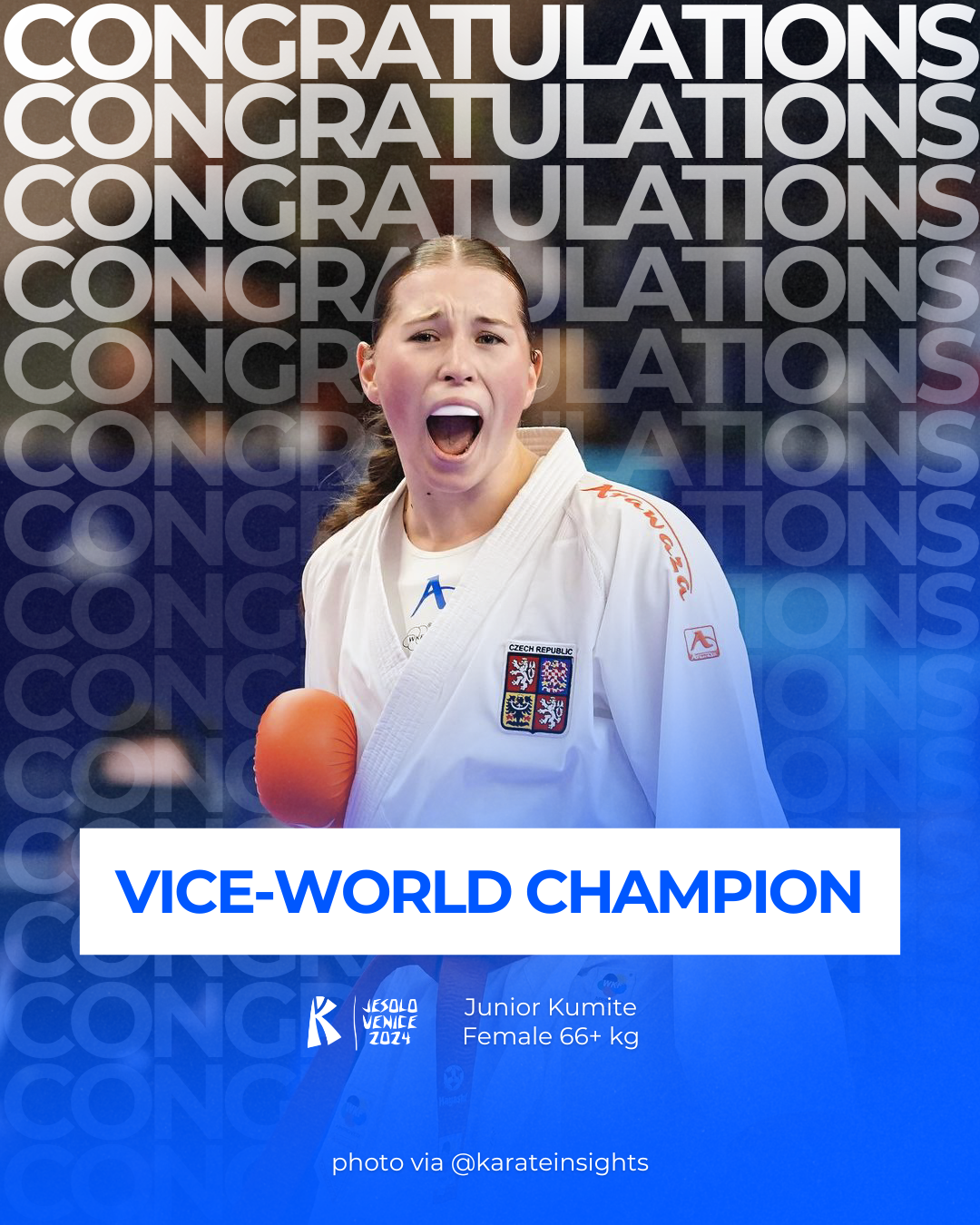Amálie Haková takes silver medal from World Karate Championships.
What was going through your head when you got to the finals?
The whole three-month preparation, both at home and abroad, went through my head. That all the long and hard work has paid off. And last but not least, I was extremely grateful to my coaches, especially coach Benisek, who believed in me and supported me all the time.
How did it feel to become a world vice-champion?
Bittersweet, I must say. It always hurts a lot to end a championship with a loss, but on the one hand, being second in the world is a huge achievement for me and the Czech Republic. So it's actually a childhood dream come true. I still remember watching the World Championships 5 years ago and wishing I could stand on the podium with a medal.
How did you prepare for such a big tournament - do you have a special ritual?
Long and difficult preparation played a big role in this. Thanks to it I could believe in myself that I have the skills and I am able to bring the medal home. I probably don't have a special ritual, but usually my warm-up before the matches always includes the same tennis ball exercises that I have been doing since the European Championships 2023.
Which moment from the World Championships will stay in your memory forever?
I have three main ones. And that's when I achieved the coveted medal. Next, when my mom flew in to see me the Saturday before the finals, which was one of the most important in the whole process. And the last one, probably my favourite, was when I came out of the warm-up room after the medals were announced and the whole team applauded me, then we jumped and shouted „Kdo neskáče, není Čech!“, hugging each other. I wish everyone could experience this.
What was the most difficult during the preparation for the championship?
I'm sure the hardest part was keeping that consistency in training and being able to train twice a day. Towards the end, the training seemed really long, but I stuck it out and I'm so glad for that!

Graphic: JANDASPORT®
Amálie Haková.
A talented karate fighter who has fought:
- Silver at the World Karate Championships 2024
- 2x European Vice-Champion 2023 and 2024
- 4x Czech champion
- 5x medals from world leagues
What do you think set you apart from the other competitors?
Definitely having people around me who support me, believe in me and are with me no matter what.
What this success means to you in the context of your career?
It means a lot to me. I fulfilled my dream of winning a medal at the World Championships. It confirmed that I'm on the right track.
Were you ever nervous at the World Cup? How did you deal with that?
The last championship was very stressful for me. I was expecting a result from myself, and it didn't come. This taught me to go into the match without high expectations and let it flow.
How has this success moved you forward as an athlete?
It gave me a boost in confidence. Now I know that phrase - "If you believe in yourself, anything can be achieved." - is really true.
Do you have a favorite song that motivates you before the game?
I have a special playlist for competitions, but my favorite is WHERE SHE GOES by Bad Bunny. I always play it at least five times.
Do you have a role model in karate who inspires you?
I have two. Elena Quirici, who I was supposed to train with this summer. Elena is currently the world number one in her category. And then Gogit Arkania, who's been coming to the club for a couple of years now. He helped us figure out the tactics for the semifinals.
What advice did your coach give you before the finals?
He told me to let my body work because it knows what to do and how to react. And then that this is exactly the moment we've been working for for so long.
How karate has influenced you in your personal life?
It taught me to have some order and a plan, which is very important in the life of an athlete, to know how to plan your day. It also gave me some direction in my life so that I know, for example, where to go after high school. Then I guess I would say I'm determined and I want to see things through to the end.
When did you realize that karate was your sport?
I remember that exactly. It was when I won my first medal at the World League in 2021, where there were over 120 competitors in my category. That's when I told myself I wanted more results like that.
How do you relax after a hard workou?
Usually, when I have the energy, I roll or massage myself with a massage gun. And I can't miss a good load of food.
Where do you see yourself in five years in the karate world?
Well, hopefully with a world or European title. I would also like to repeat my success in the senior category.
What advice would you give yourself if you went back to the beginning of your career?
I guess I would tell my younger self to hang in there, enjoy the process, the people around you and everything will come in time. And to dream, because dreams really do come true.
What advice would you give to beginner karate fighters?
Don't be afraid to have big dreams and go for them. Surround yourself with people who won't trip over your feet and who support you and believe in you. In my opinion, anyone who doesn't want to reach the top step has no chance of success.

Photo: @karateinsights, Graphic: JANDASPORT®
Karate kumite
Karate kumite is one of the three main parts of karate, along with kihon (basic techniques) and kata (predetermined sets of movements). Kumite translates to "fighting" or "sparring" and is a practical match where two opponents apply karate techniques in real combat.
Kumite began to develop especially in the 20th century, when karate spread outside Japan. As it grew in popularity internationally, competition rules and scoring were introduced to make karate kumite a safe and structured discipline.
The first world karate championship was held in 1970 in Tokyo, organized by the World Karate Federation (WKF). The WKF is currently the main international organization that regulates the rules of competitive karate, including kumite.
In kumite competitions, fighters try to score points for accurate and controlled hits on the opponent's body. Punches and kicks must be executed with control, as full contact is not allowed. The fight usually lasts 3 minutes (men) or 2 minutes (women) and the winner is the one who scores more points, or a decision based on more technical control, or an early victory if the point difference is large enough.
Would you like to support Amálie or collaborate with her?
Contact us to discuss the possibilities of cooperation or partnership.

We help athletes on their journey to success.
We support athletes on their path through assistance with sponsorships, partnerships, marketing, and legal matters. At the same time, we motivate young people to engage in sports, whatever the discipline may be. Our goal is to create role models out of athletes who will inspire and motivate the next generation. We want to popularize sports in general and encourage the public to be more active.

JANDASPORT®
JANDA AGENCY s.r.o.
Reg. Nr.: 08290725, VAT CZ08290725
Our Other Companies



